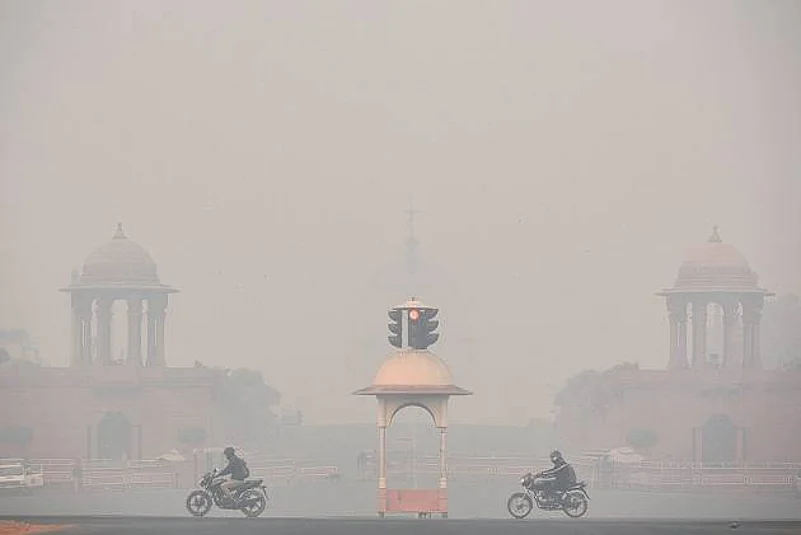A Supreme Court-mandated panel on Friday declared a public health emergency in the Delhi-NCR region and banned construction activity till November 5.
As pollution level in the region entered the "severe plus" category, the Environment Pollution (Prevention and Control) Authority also banned the bursting of crackers during the winter season.
The air quality in Delhi-NCR deteriorated further Thursday night and is now at the severe plus level, EPCA chairperson Bhure Lal said in a letter to the chief secretaries of Uttar Pradesh, Haryana and Delhi.
"We have to take this as a public health emergency as air pollution will have adverse health impact on all, particularly our children," he said in the letter.
Under these circumstances, he said, construction activities, hot mix plants and stone crushers in Delhi, Faridabad, Gurugram, Ghaziabad, Noida and Greater Noida will remain closed till the morning of November 5.
In view of the hazardous pollution levels in the national capital, doctors advised people to take a lot of precautions, including wearing face masks and avoiding early morning and late evening walks as the concentration of pollutants is at its highest during this period.
Calling the national capital a "gas chamber" Delhi CM Arvind Kejriwal on Friday blamed the government of Haryana and Punjab for failing to stop stubble burning in their respective states. He pegged farm fires as the major cause of Delhi's rising pollution level.
To effectively tackle the menace of pollution, the government has started distributing 50 lakh N95 masks, considered one of the good quality masks for tackling smog, among school students in Delhi on Friday morning.
The blanket of haze over Delhi thickened on Friday morning with the national capital's pollution levels increasing overnight.
According to official data, the overall Air Quality Index (AQI) on Friday was 582 at 12.30 am for Delhi-NCR.
An AQI between 0-50 is considered 'good', 51-100 'satisfactory', 101-200 'moderate', 201-300 'poor', 301-400 'very poor' and 401-500 'severe'. Above 500 falls in the 'severe-plus emergency' category. The higher the AQI value, the greater the level of air pollution and health concerns.
The AQI takes into account five chief pollutants -- particulate matter with a diameter of less than 10 micrometres (PM10), PM2.5, ozone (O3), nitrogen dioxide (NO2) and carbon monoxide (CO).
Earlier, the EPCA had banned construction activities only for the period between 6 pm and 10 am till November 2. Now, no construction can take place even in daytime.
EPCA directed that all coal and other fuel-based industries, which have not shifted to natural gas or agro-residue, will remain shut in Faridabad, Gurugram, Ghaziabad, Noida, Bahadurgarh, Bhiwadi, Greater Noida, Sonepat, Panipat till the morning of November 5.
In Delhi, industries, which have not yet shifted to piped natural gas, will not operate during the period, it said.
"Cracker burning is completely banned for the entire winter period. We note that there are festivals coming and given the experience of Diwali, when in spite of all efforts, cracker burning was extremely high and led to the accumulation of toxins in the air, this measure is needed," Bhure Lal said.
He also said that it is imperative that implementing agencies take urgent steps to stop local sources of pollution, as this will only add to the already polluted air.
"This requires stringent vigilance and punitive action against all cases of local pollution, from plastic and garbage burning to dust pollution. I am also constrained to say that in spite of all our efforts, there are still many instances of local pollution and therefore, enforcement needs to be stepped up further," he said.
















